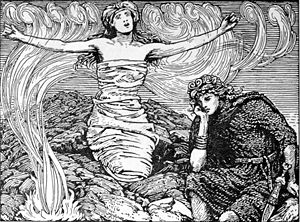
Grógaldr
Encyclopedia

Svipdagsmál
Svipdagsmál or The Lay of Svipdagr is an Old Norse poem, a part of the Poetic Edda, comprising two poems, The Spell of Gróa and The Lay of Fjölsviðr. The two works are grouped since they have a common narrator, Svipdagr. Moreover they would appear to have a common origin since they are closely...
found in several 17th century paper manuscripts with Fjölsvinnsmál. In at least three of these manuscripts, the poems are in reverse order and separated by a third eddic poem titled, Hyndluljóð. For a long time, the connection between the two poems was not realized, until in 1854 Svend Grundtvig
Svend Grundtvig
Svend Hersleb Grundtvig was a Danish literary historian and ethnographer. He was one of the first systematic collectors of Danish traditional music, and he was especially interested in Danish folk songs. He began the large project of editing Danish ballads. He also co-edited Icelandic ballads. He...
pointed out a connection between the story told in Gróagaldr and the first part of the medieval Scandinavian ballad of Ungen Sveidal/Herr Svedendal/Hertig Silfverdal. Then in 1856, Sophus Bugge
Sophus Bugge
Sophus Bugge was a noted Norwegian philologist and linguist. His scientific work was directed to the study of runic inscriptions and Norse philology. Bugge is best known for his theories and his work on the runic alphabet and the Poetic Edda and Prose Edda. -Background:Elseus Sophus Bugge was...
noticed that the last part of the ballad corresponded to Fjölsvinnsmál. Bugge wrote about this connection in Forhandlinger i Videnskabs-Selskabet i Christiania 1860, calling the two poems together Svipdagsmál. Subsequent scholars have accepted this title.
Gróagaldr is one of six eddic poems involving necromantic practice.
Necromancy
Necromancy is a claimed form of magic that involves communication with the deceased, either by summoning their spirit in the form of an apparition or raising them bodily, for the purpose of divination, imparting the ability to foretell future events or discover hidden knowledge...
It details Svipdag's raising of his mother Groa
Gróa
In Norse mythology, Gróa is a völva and practitioner of seiðr, the wife of Aurvandil the Bold.-Prose Edda:Gróa appears in the Prose Edda book Skáldskaparmál, in the context of Thor's battle with the jötunn Hrungnir...
, a völva
Völva
A vǫlva or völva is a shamanic seeress in Norse paganism, and a recurring motif in Norse mythology....
, from the dead. Before her death, she requested him to do so if he ever required her help; the prescience of the völva is illustrated in this respect. The purpose of this necromancy was that she could assist her son in a task set him by his cunning stepmother. Svipdag's mother, Gróa, has been identified as the same völva who chanted a piece of Hrungnir's hone from Thor's head after their duel, as detailed in Snorri Sturluson's Prose Edda. There, Gróa is the wife of Aurvandil, a man Thor rescues from certain death on his way home from Jötunheim. The news of her husband's fate makes Gróa so happy, she forgets the charm, leaving the hone firmly lodged in Thor's forehead.
In the first stanza of this poem Svipdag speaks and bids his mother to arise from beyond the grave, at her burial mound, as she had bidden him do in life. The second stanza contains her response, in which she asks Svipdag why he has awakened her from death.
He responds by telling her of the task he has been set by his stepmother, i.e. to win the hand of Menglöð. He is all too aware of the difficulty of this: he presages this difficulty by stating that:
- "she bade me travel to a place
- where travel one cannot
- to meet with fair Menglod"
His dead mother agrees with him that he faces a long and difficult journey but does not attempt to dissuade him from it.
Svipdag then requests his mother to cast spells for his protection.
Groa then casts nine spells, or incantations.
External links
- Grógaldr in Old Norse from «Kulturformidlingen norrøne tekster og kvad» Norway.
- Grógaldr (Old Norse)
- Grógaldr (English)

